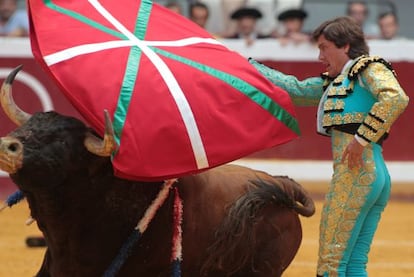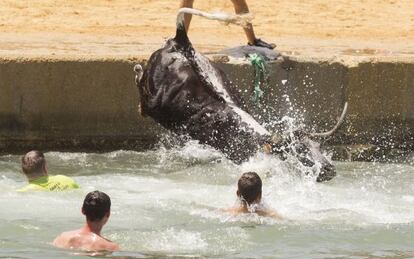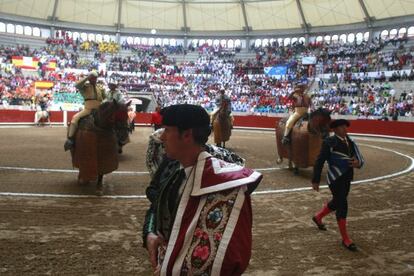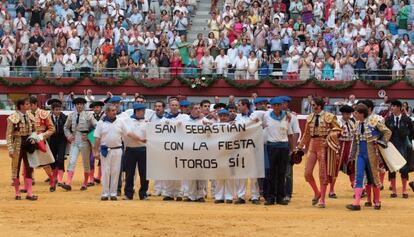Spain’s new political map raises questions about future of bullfighting
Leftist governments across the country withdraw public subsidies and plan referendums

Spain’s new political map is raising questions about the future of public events involving los toros – anything from bullfights to the custom of chasing the animals down the street (or being chased by them) during local fiestas.
The municipal and regional elections of May 24 triggered a shift to the political left, and many of the new groups in power do not look favorably upon these forms of entertainment, or upon the fact that many of them are subsidized with public money.
The Basque seaside town is the exception to the rule, as bullfighting is back this summer
A dozen municipalities, including major cities such as Alicante, are now planning to hold referendums on whether these events should be banned altogether.
Other cities and regions are also mulling ways of phasing them out, even as the number of bull-centered festivities grew last year, according to statistics released in May by the Education, Culture and Sports Ministry.
Madrid. The new city government, led by Mayor Manuela Carmena of the leftist bloc Ahora Madrid, has given up its box at Las Ventas bullring. Carmena has announced that she intends to turn the Spanish capital into “an animal-friendly city” and supports eliminating all subsidies to bullfighter training schools and bullfights.
Valencia. The Valencian regional government said it will stop subsidizing bullfights, and in the city of Valencia, the new leftist mayor, Joan Ribó of Compromís, said he will not encourage bullfights or subsidize anything that involves animal cruelty.
Alicante will stop subsidizing bullfights, and the new local government also wants to hold a referendum to see whether the city should be declared completely free of bullfights.

The popular resort of Gandia has already banned fights because it is “animal abuse” and because of the public expense it entails. Another Valencian town, Alzira, will no longer hold bous al carrer (running of the bulls), a popular tradition in many Catalan and Valencian villages. In Denia, another seaside town, the city is considering a referendum on its bous a la mar, in which the bull ends up being pushed into the sea.
Aragón. Zaragoza officials met with neighborhood associations in the city and in rural areas to inform them that there will be no more public subsidies for fiestas involving toros embolados (bulls with firecrackers attached to their horns) or toros ensogados (bulls with long ropes tied to their nape). Huesca may also hold a referendum on whether to ban bullfights altogether.
Galicia. The mayor of A Coruña, Xulio Ferreiro of the bloc Marea Atlántica, has terminated the contract with the company that organizes bullfights in the city. Ferreiro argued that the city will save itself €50,000.

Balearic Islands. The leftist coalition that controls Palma de Mallorca plans to declare the city “free of animal abuse.” But the move will only be symbolic when it comes to bullfights, as the local ring is privately owned and holds a regional operating license. The city will ask the regional assembly to change its 1992 animal protection law in order to ban all forms of bull-related fiestas across the islands. Activists have already collected around 130,000 signatures asking for this ban.

San Sebastián. The Basque seaside town is the exception to the rule, as bullfighting is back this summer. The Basque Nationalist Party (PNV) recovered control of city hall in May after a four-year stint under the radical leftists of Bildu, who had banned it (even though in the nearby municipality of Azpeitia, also under Bildu control, the fights were allowed to remain because of a strong fan base).
Additional reporting by Andreu Manresa, Maiol Roger, Cristina Huete, Ignacio Zafra and Aitor Bengoa. English version by Susana Urra.
Catalonia, five years without bullfights
Five years ago, the Catalan assembly approved a regional ban on bullfighting with 68 votes in favor, 55 against and nine abstentions. Since then, supporters of the fiesta have been seeking ways of bringing it back, but so far to no avail.
La Monumental, the only ring that was still operational at the time, is now the subject of political discussion as lawmakers seek a new use for it. Meanwhile, tourists seeking Spanish folklore can now watch corridas in which the animal does not die, held at cattle ranches near the Ebro river.
Meanwhile, the future of the correbous (running of the bulls) is ensured through regional legislation that protects them in 30 municipalities where they are considered a local tradition.







































